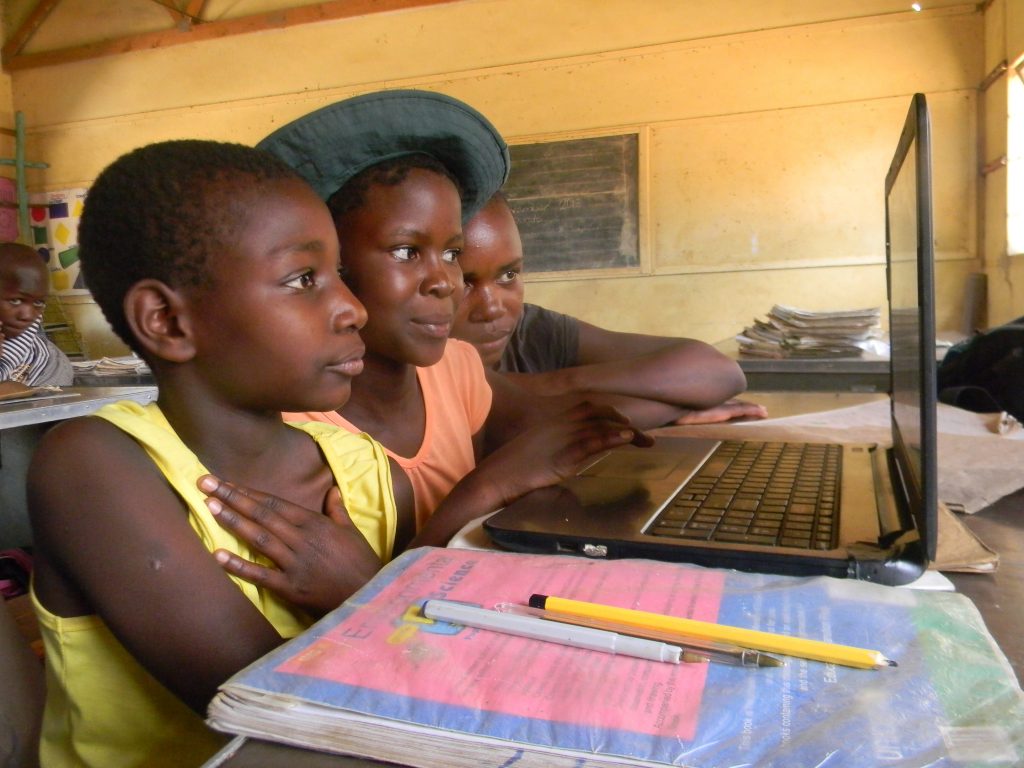Without any doubt has digitalization become increasingly rampant in today’s economy. To compete at a global level, being a developed economy is not enough; digitalization has to take place at the roots. Countries prioritizing digitalization as part of their national strategy are reaping significant social, economic, and political benefits.
Governments play a crucial role in promoting thorough digital development through logistics, governance, and investment. To implement a sustainable digitalization strategy, they must collaborate with various stakeholders, including private companies, institutes of higher education and the civil society. Besides, they need to make efforts in reducing taxes on digital investments and support the development of high-speed fixed and mobile broadband connections.
To ensure that the future generation is capable of making the best use of its opportunities, a creative digital curriculum must be introduced in schools. Further, institutes of higher learning must be able to perform research in areas like artificial intelligence, data mining, and robotics. By partnering with smaller companies and supporting innovative startups, governments, as well as large organizations, can serve as role models and lead the way towards sustainable investment.
Hence, to promote nationwide digitalization, the development of an effective national strategy is not enough, the implementation of this strategy has to be collaborative in nature as well. Thus, the digitalization of a country takes place through the synergy between its government, its corporate enterprises, its educational institutions, and most importantly its people.
The process of taking a country online is extensive and riddled with infrastructural and institutional challenges. Both, policymakers and the private sector have to work in tandem to make efforts beyond investing in the ICT infrastructure. Governments need to prioritize initiatives and programs that promote the establishment of a digital economy and culture which act as the foundation for economic competitiveness and citizen engagement.
 Digitalization is becoming so deep-rooted in daily activities, that it has become nearly impossible to imagine a world without the internet. The same shift can be observed in Africa, where the internet is increasingly gaining influence in the way people live, work, and govern.
Digitalization is becoming so deep-rooted in daily activities, that it has become nearly impossible to imagine a world without the internet. The same shift can be observed in Africa, where the internet is increasingly gaining influence in the way people live, work, and govern.
In the health sector, for instance, digitalization does not only have an added advantage for patients but for practicing doctors as well. It has softened the impact of insufficient resources and geographical distance, factors which had long been preventing millions of Africans from access to primary medical care.
While the quality of education has always remained a significant challenge in African countries, the digitalization of the education sector is changing this scenario. Due to reduced data rates and decreased prices of mobile phones, access to communication is becoming the norm. This has resulted in easier access to educational resources both inside and outside the schools. Further, low-cost smartphones and tablets are facilitating the movement of online education out of the traditional school environment, making access to education more flexible.
The growth of the African agriculture sector has always been threatened by weather changes, rural-urban migration, and low farm productivity. While reforms in policy have done little to ameliorate this situation, digitalization has significantly enhanced prospects. To improve yields, African entrepreneurs have launched digital initiatives which, for instance through cloud computing and open source software deliver affordable solutions. Weather forecasts, soil sensors, warnings from automated systems, and aerial drone images are just a few examples of digital solutions which provide farmers with the foresight they need to manage their crops in real time.
From a social perspective, the introduction of digital technology in Africa is also changing the cultural landscape into one where every member of the community has a voice. It has given people a platform to communicate with each other in a manner that had never been possible before. This free flow of thoughts and ideas has also given birth to many African narratives, where people break the cultural stereotypes to tell the stories of what defines the true African spirit.
Many African countries have already made significant progress with regards to digitalizing their economies. The development of their ICT infrastructures has not only created job opportunities, but it has also led to an overall decrease in supply costs, thus making prices cheaper for customers. The internet has for instance established digital banking, with money transfer apps like M-Pesa, which can be easily installed on mobile phones. The burgeoning digital economy is facilitating the flow of funds without the need to visit a bank or an ATM.
 While digital transformation has caused significant reforms in the private sector, it has also triggered a rethink in governance. The digitalization of government services increases transparency and simplifies basic processes like the issuance of ID cards or driving licenses. The rapid use of social media further contributes to a social awakening that advocates transparency in governance.
While digital transformation has caused significant reforms in the private sector, it has also triggered a rethink in governance. The digitalization of government services increases transparency and simplifies basic processes like the issuance of ID cards or driving licenses. The rapid use of social media further contributes to a social awakening that advocates transparency in governance.
The internet is not only a gateway to knowledge, communication, and innovation; but can also serve as an effective tool against money laundering and corruption. The extensive use of social media plays a crucial role in generating awareness among the masses about their fundamental rights towards the disruption of despotism. The collective camaraderie makes it increasingly difficult for national governments to exercise absolute tyranny.
The internet also encourages people to share their encounters with corrupt officials and the free flow of communication that social media offers can give birth to attention-drawing anti-corruption campaigns. The participation of people in online debates and events also emboldens them against tolerating corrupt regimes. The promise of free flow of thought given by online platforms offers people to voice their experiences, thus creating a vital force against bribery and corruption.
The constant growth of the African economy since the 2000s has been fostered by digital innovations like data analysis and cloud computing, and Africa is still benefiting from the opportunities that these innovations generated. While essential development efforts have been made in finance, education, health, retail, agriculture, and governance, Africa still has an untapped potential that can be harnessed through digitalization.
The future of business and trade will be defined by digitalization, and a failure to catch up will inevitably render Africa losing out on its foreign trade opportunities. Even though the technology sectors are flourishing in countries like South Africa, Kenya, and Nigeria, other regions of the continent are yet to meet their expectations.
60 percent of the sub-Saharan population still does not have access to electricity, and those who understand how to operate a computer, lack the resources to learn how to excel in it. Only eight of the world’s top thousand highest rated universities have their home in Africa. The effects of such immense deprivation in a rapidly expanding global economy act as hurdles for a fast digitalization of the continent.
Furthermore, the awareness of what can be achieved with a fully digitalized nation is shallow for most African governments, thus contributing to the slow pace of digitalization. A typical African student’s first interaction with a computer is in high school, as opposed to other countries, where students interact with computers at the beginning of their curriculum. This ignorance perpetuates in the business economy as well, thus bringing forth a generation of company executives who are unable to assess how digitalization could benefit their enterprises.
Another hurdle for a fast digitalization of Africa is the lack of skilled technicians. Not only do digital enterprises find it hard to secure programming talent, but they are also severely lacking in people who have the technical know-how required to set up a functioning digital enterprise. As a result, companies end up outsourcing their technical support. Further, the absence of like-minded visionaries who have a real interest in encouraging African digitalization is also a part of the long-standing deficiency in its digital revolution.
The digital development of the African continent is not just the responsibility of a single governing body; it can only be achieved through the active participation of all members of the community. While political reforms are necessary to promote faster adaptation of new ICT business models, governments need to invest in the development of essential infrastructure as well.
The internet offers never-ending possibilities of growth in every sector, and organizations and governments alike can work in synergy to build on this growth. Governments can collaborate with telecommunication companies to introduce more affordable data rates and set up free Wi-fi spots to promote higher internet penetration.
Similarly, the two can work together in joint ventures to establish technical hubs that help local and small businesses expanding their opportunities. Organizations can also extend their resources on training the African youth to develop a skilled workforce that can support the digital development of the continent.
 In recent years, Rwanda has emerged as a digitalization success story. When Paul Kagame became the country’s president in 2000, he proclaimed his state to become a knowledge-based economy in the next two decades. 2008 saw the capital city of Kigali becoming connected through an intricate network of fiber-optic cables, and by 2010, this network had covered the entire country. Two decades ago, Rwanda’s higher educated population was merely 4,000, and today, it stands at 86,000.
In recent years, Rwanda has emerged as a digitalization success story. When Paul Kagame became the country’s president in 2000, he proclaimed his state to become a knowledge-based economy in the next two decades. 2008 saw the capital city of Kigali becoming connected through an intricate network of fiber-optic cables, and by 2010, this network had covered the entire country. Two decades ago, Rwanda’s higher educated population was merely 4,000, and today, it stands at 86,000.
24 years ago, Kigali, which is also the country’s largest city, was coping with a genocide that killed 800,000 citizens. In the meantime, the country has become an incubator for digital innovation that has given birth to some successful tech startups. As a small country with a proactive national government, Rwanda acts as a fertile ecosystem for the development of digitalization. This change in the economic landscape was possible due to the country’s efforts to develop its digital economy.
Rwanda’s efforts began with the development of its ICT infrastructure through the establishment of a national data center that centralized services like information storage, protection, and management, as well as cloud computing. Further, a national fiber-optic network was established to connect Rwanda to other international sea cables. This not only resulted in increased internet affordability and accessibility, but it also connected Rwanda to the global networks.
To keep the Rwandan workforce up to speed with other developed countries the government is spearheading investment for the digitalization of skills and creating a workforce which is better equipped to benefit from the country’s flourishing ICT sector. The government of Rwanda has also launched schemes like the ICT Park and Smart Africa to upskill its workforce.
These efforts by the Rwandan government to support rapid digital development are well on their way to achieve the country’s Vision 2020. By laying down the basic foundation for the country’s digitalization, Rwanda will soon establish itself as one of the most prominent digital hubs in Africa, and an excellent example of how to successfully digitalize a country.



7 comments
Comments are closed.